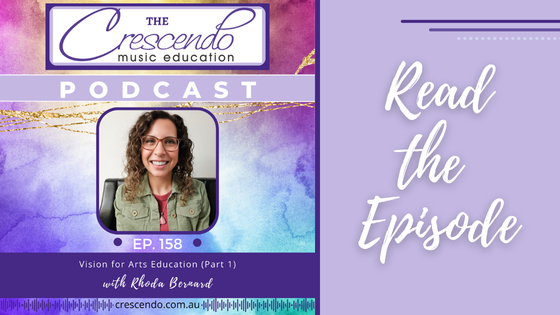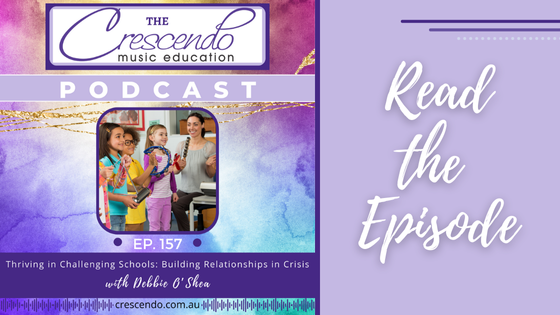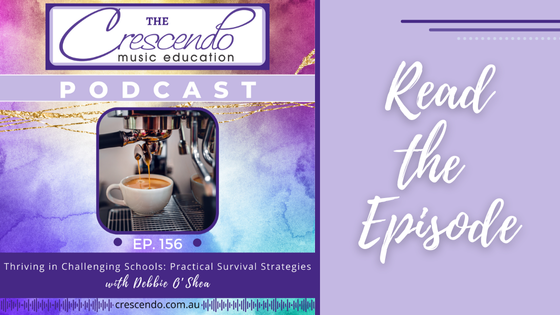
Introduction
Here is the Crescendo Music Education Podcast – Episode 83. This is number one in a series of podcasts, where we will discuss music teacher wellbeing. Now this is a very important focus because our job is fairly full on, fairly hectic and we need to look after ourselves. So I have invited Beth Duhon on to the podcast with me to do this series.
They are going to be a number of shorter episodes, where we deal with some important topics, some considerations for your wellbeing. So I do hope you enjoy and spend some time thinking about how you can look after yourself.
This podcast is being recorded on the lands of the Turrbal people. I acknowledge them as the traditional owners of the land and pay my respects to elder’s past, present and emerging.
They were the first music makers on this land.
About ‘Read the Episode’: Sometimes, we would rather skim visually than listen to a podcast! That’s a great way to learn too!
The transcript of episode 083 of The Crescendo Music Education Podcast is below.
Introducing Beth Duhon
Debbie
Hello, and I would like to welcome to the Crescendo Music Education Podcast Beth Duhon. Hello, Beth.
Beth Duhon
Hello, Debbie.
Debbie
It is so lovely to have you on my podcast, because we’re going to talk about a very, very important topic, which is why I really wanted you on this podcast. We’re going to talk about music teacher wellbeing.
Beth Duhon
Yes, ma’am.
Beth Duhon’s Biography
Debbie
It’s really important. So I think we should start, I’ll read a little short bio so that people who maybe have not come across you, your book, your podcast, we can talk about all of those things later. But people who don’t know you this will give them a little bit of background. Beth has over two decades of experience teaching music in Virginia and Texas. She has taught pre K, parent and child classes, K to five and five to eight general music and private horn lessons.
As a performer she has performed professionally at Busch Gardens Williamsburg and freelanced in the Houston area in orchestras, musicals and churches. She has a bachelor’s degree in music education from Illinois Wesleyan University and a master’s degree in horn performance from University of Houston. Beth has presented on music teacher self care, which is what I’ve got here, for the OAK national conference IAMEA, NJMEA Summer Conference, MusicPlay online.com, TMEA, TCDA and Houston arts partners conferences.
She has been a podcast guest on Mrs. Stouffers VIP music room podcast, afternoon ti (spelt t-i) music cast, the elementary music teacher podcast and the music room with Aileen Miracle. Miss Duhon’s Facebook group is ‘Self Care for the Music Educator.’ You can find her on all social media platforms, and her podcast is Happier Music Teacher. That is you.
Beth Duhon
There you have it.
Debbie
Now, before we go on, is there anything that you would like to add to that bio?
Beth Duhon
Absolutely, so the most important thing is actually not my bio, which is my personal life. So I was married to the love my life, Jimmy, in the year 2000. And we have a soon to be 13 year old son Mark.
Debbie
And that’s the important stuff, isn’t it?
Beth Duhon
It really is.
Balance in the Life of a Music Educator
Debbie
And our job is so big as music educators that it’s, I shouldn’t say it’s easy to lose sight of that. But it’s easy to feel like your life is slightly out of balance. And you’re not paying enough attention to that important side of your life.
Beth Duhon
Because if you don’t, it will get away from you. And I think it’s just so easy. We get those accolades. We think the kids need us and before long, we’re just sucked into being 97% our profession and 3% our personal life.
Debbie
Yes. And I think there are many music teachers listening now. Sort of nodding along going, yes, I’ve been there, or I am there, or I am heading there. So that’s why I think that taking some time, and thinking about your well being and the balance of your life and knowing that balance isn’t necessarily, I don’t think of balance as you know 50/50 equal. There’s season’s and there’s times, you know, when we’re writing report cards, you can’t say well, I’m not going to do that even though they’re due Monday, because this is a day for my family, you know, so there’s ebbs and flows, but there’s got to be a feeling of balance hasn’t there.
Beth Duhon
Agreed. We’re all on the same page there.
For What Are You Most Grateful?
Debbie
Absolutely. So before we talk about your book, because I would really like to get into your book and some of the important messages, I’d like to talk to you the way I talk to all my guests about gratitude for what are you most grateful? And I’m sure we live in quite a privileged time I think in our society, we’re not, you know, fighting desperately for our food. You know, I just think we’re privileged. So there’s a lot to be grateful for, but for what are you most grateful?
Beth Duhon
I am so grateful for my parents. My dad is 91, my mother’s 81. They had me when they were older, I’m older. So I realised that that’s not a privilege that I’m going to have forever, but I am sure grateful to have them. And you know, some people have a story where their parents were not very supportive about music.
I was the opposite.
They didn’t push but they were supportive to the extreme. I have really fond memories of my dad taking me to the symphony, and us getting Taco Bell for his first time on the way home. And you know, my mother was a good stage Mum, I’m really ridiculously blessed with my family.
Debbie
That is so lovely. Yes, that’s such a special time. And a special way to start your journey, I think isn’t it?
Beth Duhon
I agree.
What Made You Write a Book?
Debbie
It’s wonderful. I would also like to know, before we get into the contents of your book, what made you write a book?
Beth Duhon
You know you got me thinking, and I’m not sure. So I know that something prompted me to submit the Tmea. And I don’t know what that was, I really don’t. I think probably to be honest the campus I was on at the time, I was feeling a lack of appreciation.
So I was probably searching for it somewhere. And so I submitted about self care to TVA, it was before the pandemic and it got denied, something told me to do it again. Then since it was with a pandemic, of course, it became a clinic. And that just opened a lot of doors for me.
Then I was on Jessica Grant’s podcast, and met her in person. And she really encouraged me, she said, you know, Beth, you’re to me outlines a book. I just kind of fought that. And then I kept on hearing that message from a couple more people.
Someone messaged me, he’s a friend who illustrates and said, Hey, if you ever need an illustrator for your book, let me know. I’m like, what book? I had two administrators who said, Well, you know, there’s probably a book in the future. And I stopped fighting it and did it. And it really was a joy to write.
Debbie
Wow. And obviously, it was needed. I mean, we all needed it but the pandemic certainly pushed us all to really think about the topics that you’re talking about.
Beth Duhon
Big time. And for me, it was cathartic to write it. It just really fit easily into the margins of my day, when my son was at Taekwondo, or he was at swim, I would just park it with my laptop. And that gave me the structure to write it.
I really, I’m burdened for music teachers, myself being one and just, I love them so much. And we are so overworked and underappreciated and bad at taking care of ourselves, you know, and so I really feel burdened for them. So I wanted to write it.
How Did the Book’s Sections Fall Into Place?
Debbie
That’s wonderful. So when you did write it, did the categories and chapters, you know, sections? Did they fall into place quite quickly, and you just filled them out? Or did they come one after the other.
Beth Duhon
So that was interesting. And you’ll see my faith just kind of flows naturally from when I speak and everything. But when I wrote The TMEA talk, I would almost call it a ‘God download.’ I literally, I sat at my garage one morning, and I just took the download and just spilled it out on the paper.
So when I did get the meeting with Dr Ghoulish with their flat books to take care of it, that’s how I structured it. So it looked like sevens. And so I was just, and that turned into 50 days. And so it just broke down naturally into those different divisions. Also, I just think small manageable pieces, because as music teachers we’re already overwhelmed, and sometimes the thought of even just doing a little bit of journaling every day is too much.
So the more manageable and bite size the pieces, I thought the better.
Debbie
Okay, so you designed the book in the end, so that somebody could pick it up. Just read a little bit, consider, consider, maybe apply, maybe try out, I’ve just started reading your book, and I’m really enjoying it. But tell us how you imagine music educators consuming your book.
How Music Educators Should Consume Beth Duhon’s Book
Beth Duhon
Of course. First off, there is no guilt. So if you sit down and read it cover to cover, your book will not catch on fire? Because sometimes for me that daily stuff, I’m not good. And I’ll beat myself up and be like, ah, it’s a 50 day book. I’m on day 55 I haven’t done it right.
And there’s no right or wrong, anything that you take from it.
But ideally, as a bit of some solitude in the morning, before you start your day to just like for me. I always do coffee and Bible with my cat on my lap. So maybe you segue from that into the book instead of your social media and just work on one small section at a time.
The beefier parts I think would learn them itself well to the weekend. And then the shorter parts would lead themselves to the week. So hopefully you could do the intro like on a Saturday or Sunday and the reflection on a Saturday and Sunday and keep the other parts a little bit shorter and easier for during the week.
Debbie
That is wonderful. Look, what I would like to do now is to have you back for another episode, where we start looking at the content. So for now, to finish off this first introduction to you and your book, we’ll put a link to where they can find your book, and where all of my listeners can connect with you on social media and all of those things.
And then when I talk to you again, let’s get into the meat. And you can give us some little bits of advice around the sort of content that you have covered in your book. Would that be okay?
Beth Duhon
That’d be lovely. And I give people advice whether they ask for it or not. So I”m glad that someone’s asking for it for a change.
Debbie
I think a few teachers are like that aren’t they. So let me get you back really soon. It’s been lovely to chat.
Beth Duhon
Thank you for having me Debbie.
Sign-Off
Thank you for joining me for this podcast. Don’t forget that you’ll find the show notes on crescendo.com.au/83. Also, you can find the transcripts there. So you’ve got all of the detail that you need. If you found this podcast useful, I’d really love it if you share the link with a colleague. Remember all I can be is the best version of me. All you can do is be the best you. We’ll will meet again. I hope we will. Bye
Just for Laughs
As we know laughter relieves stress don’t lose sight of the funny side of life.
Why did the banana go to the doctor?
Because he wasn’t peeling well.
It’s bad even for me, isn’t it?
Links Mentioned in the Episode:
📕 Happier Music Teacher by Beth Duhon
Where to find me:
- Crescendo Community Facebook Group: https://www.facebook.com/groups/crescendocommunity
- Official Crescendo Page: https://www.facebook.com/CrescendoMusicEd/
- YouTube: https://www.youtube.com/user/CrescendoMusicEd
- Twitter: https://twitter.com/crescendomusic
- LinkedIn: https://www.linkedin.com/in/debbie-o-shea-62a3741b/
- Instagram: https://www.instagram.com/CrescendoDebbie/
- Pinterest: https://www.pinterest.com.au/crescendodebbie/




Leave a Comment